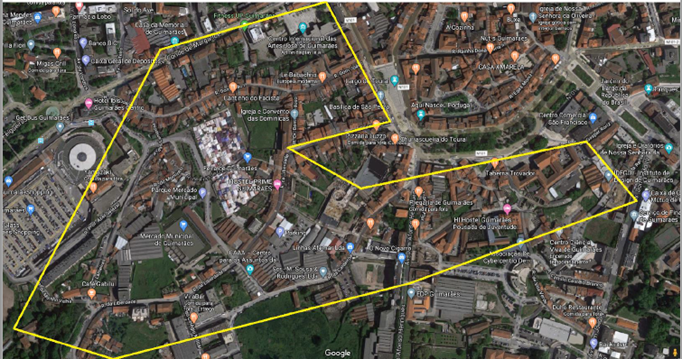Guimarães' Pilot City Activity: District C - A zero-carbon commitment

District C location
Description of activities
District C (social experiment for neighbourhood development based on culture, knowledge and creativity) as a testing ground for zero-carbon policies. The basis of the pilot activities are a citizens’ pact for carbon neutrality and co-creation strategies that enable action in different areas, such as energy, mobility, circular economy, waste and land use. Actions will involve different stakeholders, namely universities, cultural and arts associations and organisations, as well as companies focusing on strong civic engagement. The pilot activities will address cross-cutting challenges in governance and policy, finance and behaviour change capacity. These are related to individual and institutional cultural patterns that are difficult to break/change in the city. In addition, specific challenges are addressed:
- Electricity consumption for buildings, facilities and infrastructure.
- Citizens are unaware about what can be done and do not have the financial means to improve the energy efficiency of their homes.
- Multi-family housing: condominium regulations.
- Consumption of non-electric energy for thermal purposes in buildings and facilities. Similar to the previous sector, lack of investment capacity.
- Waste management: cultural unawareness about circular economy and waste production/management.
- Land use: increase the awareness of ways to connect with nature, through sustainable practices such as urban community gardens and green spaces.
In summary, Guimarães wants to take a step forward with the District C pilot project by strongly involving citizens and putting them at the centre of change.
Objective
Implement pilot activities that function as a testbed for a range of measures to achieve a zero-carbon district, with a strong focus on citizen engagement and fostering a community sense of belonging.
Are the pilot activities building upon or part of a previous and/or existing activity?
In recent decades, Guimarães has laid the foundations for its national and international visibility through a series of strategic projects capable of promoting processes of urban regeneration, enhancing the built historical heritage and strengthening the role of the creative industries in the economic and sustainable development of the municipality.
District C was established to mark the 20th anniversary of its designation as a heritage site by UNESCO and the 10th anniversary of its designation as European Capital of Culture. In addition, District C is a pilot project that is the result of Guimarães’ continuous efforts, from its participation in the EU Mission for 100 climate-neutral and smart cities by 2030 to the awarding of the National Sustainability Prize: Ecosystem of Governance Guimarães 2030, among other notable achievements.
Which emissions domains will the pilot activities address?
Systemic transformation – levers of change the pilot activities will exploit
Stakeholder types that you would like to engage in the pilot activities
Transferable features of your pilot activities to a Twin City/ies
District C pilot activities address common issues that many cities face, such as clean energy supply, clean mobility, waste management and circular economy, carbon capture and how to put citizens at the centre of climate action and justice. The transferable features of the pilot activities lie on:
- Democratic approaches: bringing citizens closer to climate neutrality and opening spaces for their participation/decision-making.
- National transferability to one-stop-shops and citizen-run renewable energy communities.
- Sustainable mobility, with Guimarães offering new approaches to the interface between public transport and local commerce.
- Dissemination strategy: generate shared knowledge and best practices that can be replicated in other contexts to enable universal application, with activities such as communication, dissemination plans, learning activities and replication and use plans.
- Best practices/knowledge transfer on sustainable financing and management of pilot activities.
This answer is not exhaustive and simply an indicative one.
Components of the transferable features
As for the assessment of transferability, Guimarães intends to elaborate concrete elements in the course of the pilot activities. The following elements are likely to be transferable/adaptable to a partner city, depending on the different areas:
Citizen engagement:
- Common sustainability matrix: municipal document summarising the climate neutrality actions and activities that were raised during the co-creation sessions with different citizen groups.
- Platform – a commitment to carbon neutrality: an online platform to inform citizens about the results achieved, to disseminate the pilot project, to inform about the ongoing activities and to have an open forum for discussions and a virtual library.
Community energy:
- One-stop-shop (OSS): learning from the experience of Guimarães in preparing the feasibility studies for OSS implementation.
- Capacity building programme: aims to build capacity of city staff and policy makers on energy efficiency and clean energy.
- Guidance Package for the energy rehabilitation of monuments: this guide aims to be a living source of solutions to preserve the historical aesthetics while improving the energy efficiency of the buildings, introducing renewable energy sources and involving citizens.
Clean mobility:
- Sustainable Daily Transport Plan: although the Sustainable Daily Transport Plan will be tailored to Guimarães, this plan can provide information on how to dynamise a clean and public transport on a daily basis.
- Active mobility capacity building: this action aims to improve non-carbon mobility modes and teach safe and responsible use of bicycles and scooters.
Circularity:
- Circular economy: companies experience the desire to become more eco-friendly and embrace innovative circular business models. The local circular business models emerging in Guimarães can be adopted by the Twin City.
- Business symbiosis marketplace: Guimarães will establish a marketplace to promote matchmaking and marketplace actions to support local business symbioses and start-ups based on circular economy strategies.
From District C to City & World:
- Dissemination materials: informative brochures on the pilot activities, explanatory panels such as urban community farms, second-hand stores, resulting in concrete elements that can be transferable.
- Scale-up and replicability plan and exploitation plan: the Twin City can learn through with the replication and exploitation practices of Guimarães and other Pan-European cities that replicate actions implemented on District C.
Continuity financing:
- Circular business technical assistance session: technical support sessions consist of business development support, coaching and learn how to interact with investors.
- Financing matchmaking and marketplace activities: Networking activities aimed at helping start-ups find the ideal investor.
Coordination, management, and impact evaluation:
The activities related to coordination, management, and evaluation of the pilot project allow Guimarães to measure its:
- Impact and citizen engagement measurement
- Knowledge transferability, dissemination and replication
- Transferable content, physical and virtual (books, platforms, etc.) and learning experiences (capacity building plans).
This answer is not exhaustive and simply an indicative one.
What does the city want to learn from Twin City/ies?
Guimarães with the Twin City expects to learn the following:
- How to engage citizens in practical actions related to clean energy mobility, circular economy, and active participation in the daily life of the municipality? How can the municipality bring behaviour change that will lead to the realisation of the Guimarães climate ambition?
- How can the planned pilot activities be implemented, e.g., improving energy efficiency and using renewable energy in the city centre, if the regulation restrains these types of interventions? How can current regulations and policies be challenged to allow interventions on historic buildings that are protected as heritage sites?
- How can the necessary change and implementation of pilot activities be financed if the municipality’s resources and budget are limited/not sufficient? How can the municipality explore new business models that will allow Guimarães to attract investment?
The main lessons Guimarães expects to learn from a Twin city are mainly related to new ways of regulation and policy, practical and real engagement of citizens in climate change actions and attracting and retaining funding and investment.
This answer is not exhaustive and simply an indicative one.

